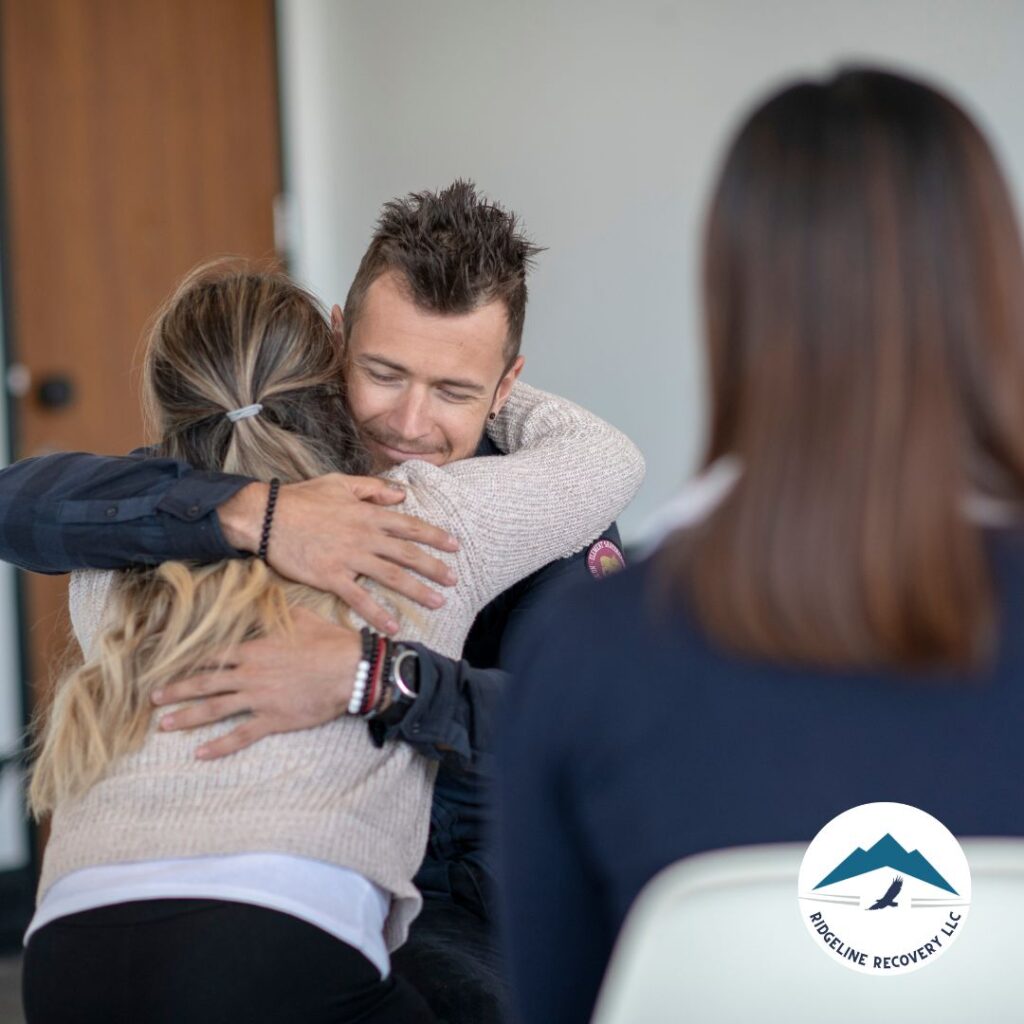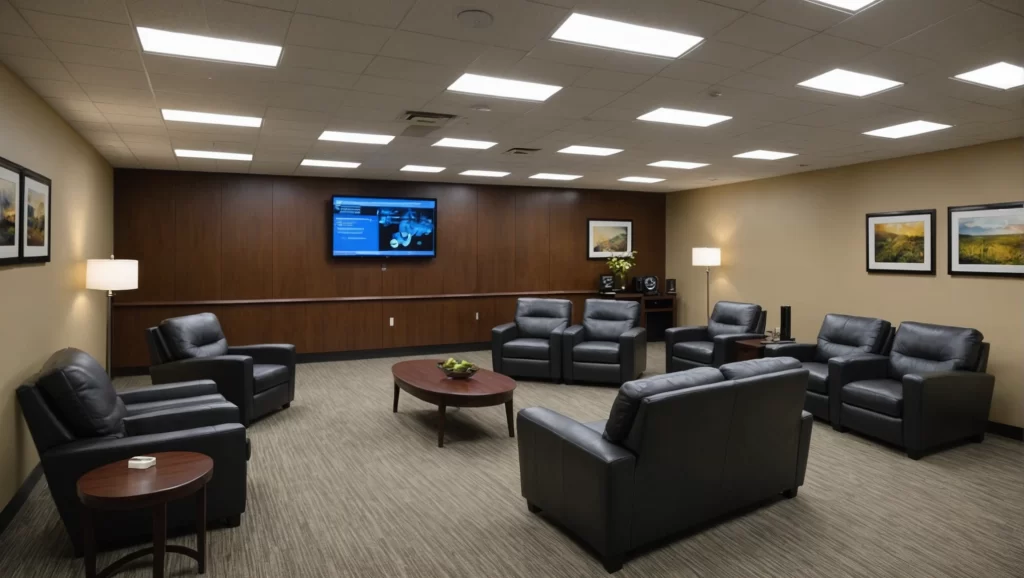When you hear the term addiction therapy, what comes to mind? If you’re battling addiction or have a loved one who is, you’ve probably asked yourself questions like:
- “Will therapy really help me get better?”
- “How do I know which treatment center to choose in Ohio?”
- “What if I relapse after getting help?”
These are real concerns. Addiction therapy can feel overwhelming at first, but it’s the bridge that takes you from struggling with substance abuse to reclaiming control over your life.
In Ohio, people from all walks of life are finding recovery through addiction therapy services. From faith-based mental health facilities to non faith-based recovery, the Buckeye State offers numerous options. But with so many different approaches out there, how do you know which one is right for you? That’s what we’ll explore in this blog.
Understanding Addiction Therapy
Let’s be clear: Addiction therapy is not a one-size-fits-all solution. It’s a comprehensive, personalized treatment plan designed to tackle the root causes of addiction, helping you not only stop using but stay sober.
In Ohio, addiction recovery Columbus centers like Ridgeline Recovery LLC offer addiction therapy services that integrate a variety of methods, including behavioral therapies, group support, and holistic approaches. These strategies don’t just address the physical aspects of addiction; they dive into the emotional and mental struggles that often go hand in hand with substance abuse.
Addiction therapy offers freedom from chemical dependency, empowering individuals to build better, healthier lives.

Top Strategies for Addiction Recovery
So what exactly makes addiction therapy successful? Let’s break down some proven strategies used in Ohio’s best addiction treatment programs.
1. Cognitive Behavioral Therapy (CBT)
CBT is at the heart of most addiction therapy services. It helps people understand the connection between their thoughts, feelings, and actions. Often, negative thought patterns fuel addictive behaviors. CBT works by challenging those thoughts and offering healthier alternatives.
- Example: Let’s say you’ve had a stressful day at work. Your old way of coping might have been reaching for a drink or drugs. CBT teaches you to recognise that trigger, pause, and choose a healthier response, like going for a walk or calling a friend.
2. Group Therapy
There’s strength in numbers. Group therapy provides an essential support network where individuals share their experiences and gain insight from others who’ve faced similar struggles. This is a key component in addiction recovery centers columbus.
Being around others who understand what you’re going through can be incredibly validating. It’s easier to stay motivated when you’re surrounded by people working toward the same goal.
3. Holistic Therapy
Holistic therapies like meditation, yoga, and art therapy are increasingly common in addiction therapy services. Why? Because they treat the whole person—body, mind, and spirit. At Grace Hope Treatment and Recovery Centers and other facilities, clients learn to heal through activities that nurture both their physical and mental health.
Ohio’s freedom rehabilitation center offers these holistic approaches, blending modern treatment with ancient techniques. It’s not just about stopping substance abuse, but about learning how to live a balanced, healthy life moving forward.
Faith-Based vs. Non Faith-Based Addiction Therapy
One of the first decisions you’ll need to make is whether to go for faith-based recovery programs or non religious addiction recovery options.
Faith-Based Addiction Therapy
Programs like Hope 2 Freedom Recovery Homes offer a spiritual approach to recovery. These free christian rehab centers integrate faith into the healing process, often involving daily prayer, Bible study, and religious counseling. For those who draw strength from their faith, this approach can be life-changing.
- Example: Imagine someone recovering from alcoholism finding comfort in spiritual rehab. The belief in a higher power helps them realize they aren’t alone in their struggle, providing much-needed support and encouragement.
Non Faith-Based Addiction Therapy
On the other hand, you have non faith based rehab options like True Freedom Recovery or Fyve Elements LLC. These centers focus on clinical approaches without incorporating religious elements. They still offer robust addiction therapy services, focusing on evidence-based methods like CBT and group therapy.
The choice between faith-based mental health facilities and non religious addiction recovery ultimately comes down to personal preference. What matters most is finding the approach that resonates with you.
Overcoming Common Obstacles in Addiction Recovery
It’s important to remember that recovery is not a straight path. Whether you’re in an outpatient rehab Dayton Ohio program or attending a residential rehab center in Dayton Ohio, setbacks can happen. Relapse is part of the journey for many people, but it doesn’t mean failure.
1. Relapse Prevention Planning
Most Ohio addiction treatment centers, including Ridgeline Recovery LLC, place heavy emphasis on relapse prevention. This involves learning how to manage triggers, avoid high-risk situations, and develop healthier coping mechanisms.
- Example: During telehealth alcohol treatment, your therapist might help you develop a plan to handle situations where alcohol is present. That could include having a trusted friend by your side, practicing refusal skills, or leaving early if temptation strikes.
2. Emotional Management
Addiction often coexists with mental health issues like anxiety or depression. Tackling these underlying issues is critical to preventing relapse. In inpatient substance abuse treatment in Ohio, facilities often provide dual-diagnosis care, addressing both addiction and mental health simultaneously.
London Ohio mental health centers are known for offering comprehensive services to support individuals who need help managing mental health while in recovery.
Finding the Best Addiction Recovery Columbus Has to Offer
The search for the best addiction recovery Columbus can feel overwhelming, but Ohio has some of the nation’s top recovery centers. Here’s what to look for when choosing a program:
- Personalized Treatment Plans: Look for a center that tailors its services to meet your specific needs. Whether you prefer non faith-based recovery or are drawn to free faith-based recovery programs, your treatment should align with your values and goals.
- Support for Families: Addiction impacts more than just the individual—it affects loved ones, too. Choose a center that offers family counseling and support as part of their addiction therapy services.
- Ongoing Support: Recovery doesn’t end when you leave the facility. The best addiction recovery Columbus centers offer aftercare programs to help you stay sober, such as sober house columbus ohio or telehealth substance abuse treatment.
- Accessibility: From outpatient rehab dayton ohio to inpatient substance abuse treatment ohio, Ohio offers a wide variety of treatment options. If finances are an issue, there are free christian drug rehab centers and free faith-based rehab near me options available.
Addiction Therapy Services: What to Expect
If you’re considering addiction therapy but don’t know what to expect, let’s break it down into simple steps.
1. Assessment
Your journey starts with a thorough assessment. At Ridgeline Recovery LLC, we look at everything from your medical history to your personal struggles with addiction. This helps us create a plan that’s unique to you.
2. Detox
For many, detox is the first step in treatment. This is where your body rids itself of drugs or alcohol. Ohio has several detox facilities like Freedom House Detox and rehab medical columbus ohio, which offer a safe environment for detoxification under medical supervision.
3. Therapy
Once detox is complete, the real work begins. Addiction therapy takes many forms, from individual counseling to group therapy. The goal is to help you understand why you turned to substances in the first place and develop healthier ways of coping.
Personalized Therapy Plans: Tailoring Treatment for Every Individual

No two people are the same, so why should addiction recovery be? The best addiction therapy programs, like those at Ridgeline Recovery LLC, understand that personalisation is the key to long-term success. When you first enter treatment, you’ll undergo a detailed assessment. This evaluation looks at not just your addiction, but also your medical history, mental health, and even your personal relationships.
Why does this matter? Because addiction doesn’t just live in a vacuum. It’s influenced by everything from your family background to past traumas. A personalized approach ensures that your addiction therapy plan addresses all these factors, giving you the best possible chance for recovery.
For instance, someone who struggles with anxiety might benefit from a combination of addiction therapy and anxiety-specific treatments, while someone with past trauma may need to focus more on trauma-informed care. Personalisation makes therapy far more effective, ensuring you’re tackling the right issues.
Medication-Assisted Therapy: The Science of Recovery
For some, addiction therapy alone may not be enough to break the cycle of addiction. This is where Medication-Assisted Treatment (MAT) comes into play. MAT combines traditional addiction therapy with medication to help manage withdrawal symptoms, reduce cravings, and stabilize the individual during the early stages of recovery.
- Example: Take someone recovering from opioid addiction. The intense cravings can feel impossible to resist, even when you know you want to quit. MAT might involve medications like methadone or buprenorphine, which help reduce those cravings while you focus on the mental and emotional aspects of addiction therapy.
At Ridgeline Recovery LLC and other top centers in Ohio, MAT is integrated into a holistic addiction therapy plan. It’s important to understand that MAT doesn’t replace therapy—rather, it enhances it, making it easier to focus on the therapeutic work needed for long-term recovery.
Addressing Co-Occurring Disorders: Dual-Diagnosis Treatment
It’s not uncommon for addiction and mental health issues to go hand in hand. Depression, anxiety, PTSD, and other mental health conditions often fuel substance abuse. In fact, many individuals turn to drugs or alcohol as a way to self-medicate these underlying issues.
This is where dual-diagnosis care comes into play. Dual-diagnosis treatment addresses both the addiction and the mental health condition at the same time. By tackling both, you reduce the risk of relapse and improve your chances of long-term recovery.
For example, an individual receiving addiction therapy who also suffers from depression might receive both cognitive-behavioral therapy (CBT) for their addiction and antidepressant medication for their depression. This two-pronged approach is essential for effective treatment.
At Ridgeline Recovery LLC and other Ohio centers, dual-diagnosis care is a standard part of the treatment plan. Whether you’re looking for inpatient substance abuse treatment ohio or outpatient rehab in Dayton, Ohio, you’ll find programs that treat both addiction and mental health.
Building a Support System: The Role of Family and Community
While addiction therapy can help you learn new ways to cope with stress, manage triggers, and break free from substance abuse, recovery is a long-term commitment. That’s where a strong support system comes in.
Family involvement is a crucial part of the recovery process. Many Ohio-based centers, including Ridgeline Recovery LLC, offer family therapy sessions to help mend relationships damaged by addiction. These sessions teach families how to support their loved one in recovery and address any issues that may have contributed to the addiction in the first place.
- Example: Let’s say someone in addiction therapy has a strained relationship with their parents due to their substance abuse. Family therapy allows everyone to express their feelings in a safe, controlled environment. This not only heals old wounds but also creates a stronger support system for the individual in recovery.
Additionally, addiction recovery centers in Columbus often connect individuals with local support groups and community resources. Whether it’s a sober house columbus ohio or a non faith-based recovery program, these resources provide ongoing support long after formal addiction therapy ends.
Outpatient vs. Inpatient Addiction Therapy: Which One is Right for You?
One of the biggest decisions you’ll need to make when seeking addiction therapy is whether to go for an inpatient or outpatient program. Both have their benefits, but the right choice depends on your personal needs.
Inpatient Addiction Therapy
Inpatient programs require you to live at the treatment facility for the duration of your treatment. This is often the best choice for those with severe addictions, or for those who have tried outpatient programs without success. Inpatient therapy provides a structured, supportive environment where you can fully focus on your recovery without outside distractions.
At Ridgeline Recovery LLC, inpatient care typically includes 24/7 medical supervision, detox services, and intensive addiction therapy sessions. It’s a comprehensive approach designed to provide stability in the early stages of recovery.
Outpatient Addiction Therapy
Outpatient programs, on the other hand, allow you to live at home while attending therapy sessions during the day. This is a good option for those who have work or family commitments they can’t leave behind. It’s also a great step-down option for those who have completed inpatient care and are transitioning back into everyday life.
Ohio has a number of excellent outpatient rehab Dayton Ohio options, including Ridgeline Recovery LLC. These programs offer the flexibility to attend therapy sessions around your schedule, making it easier to maintain a work-life balance while still getting the help you need.
The Power of Community Support in Recovery
We often talk about therapy and medication as key components of recovery, but community support is just as important. When you’re surrounded by people who understand what you’re going through, it’s easier to stay motivated and committed to your recovery goals.
Ohio has a rich network of addiction therapy services that offer ongoing community support. Whether it’s a freedom house detox facility, a sober house columbus ohio, or a faith-based support group, the state provides a wide range of options for those in recovery.
Support groups like Freedom Care Ohio and Team Recovery Ohio provide a safe space for individuals to share their struggles and successes. These groups are a great way to stay connected with others who are also on the path to recovery, offering both accountability and encouragement.
Telehealth: A Modern Solution for Addiction Therapy
In today’s digital age, many addiction therapy services are moving online. Telehealth substance abuse treatment allows you to receive therapy from the comfort of your own home, making it a convenient option for those who may not have easy access to in-person services.
Telehealth alcohol treatment offers the same quality care as in-person therapy, but with the added flexibility of attending sessions from anywhere. This can be especially helpful for individuals in rural areas or those with mobility issues.
At Ridgeline Recovery LLC, telehealth options are available for both individual and group therapy sessions. Whether you’re in the early stages of recovery or looking for ongoing support, telehealth makes it easier to stay on track with your addiction therapy goals.
The Role of Spirituality in Addiction Therapy
For many, spirituality plays a crucial role in recovery. Faith-based programs like Hope 2 Freedom Recovery Homes and Christian detox centers near me offer a unique approach to addiction therapy, incorporating spiritual practices alongside traditional treatment methods.
These programs provide a safe, supportive environment where individuals can explore their faith while working through the challenges of addiction. Whether it’s daily prayer, Bible study, or faith-based counseling, these practices offer comfort and strength during the recovery process.
That said, faith-based programs aren’t for everyone. If you prefer a secular approach to recovery, there are plenty of non faith-based recovery options available in Ohio. What matters most is finding a program that aligns with your personal beliefs and values.

Life After Addiction Therapy: Staying Sober for the Long Haul
Completing addiction therapy is a huge accomplishment, but it’s just the beginning of your recovery journey. Staying sober requires ongoing effort and support, even after you’ve left the treatment center.
This is where aftercare programs come in. At Ridgeline Recovery LLC, aftercare services are designed to provide continued support as you transition back into everyday life. Whether it’s regular check-ins, support group meetings, or sober living arrangements, aftercare ensures you have the tools and resources you need to stay on track.
Frequently Asked Questions About Addiction Therapy
Q: What’s the difference between addiction therapy and rehabilitation?
A: Addiction therapy refers to the psychological and behavioral treatment of addiction, while rehabilitation is a broader term that includes medical detox, therapy, and aftercare services.
Q: Can I get addiction therapy if I don’t have insurance?
A: Yes! There are several free faith-based recovery programs and free christian drug rehab centers in Ohio. Some programs offer sliding scale fees or financial assistance, making addiction therapy accessible to everyone.
Q: How long does addiction therapy last?
A: The length of treatment varies based on individual needs, but most programs last 30 to 90 days. Aftercare programs can provide ongoing support for years after the initial treatment.
Conclusion: A Brighter Future Awaits
Choosing to seek addiction therapy is one of the most important decisions you can make. Whether you’re struggling with alcohol, drugs, or a co-occurring mental health condition, help is available. In Ohio, centers like Ridgeline Recovery LLC provide comprehensive treatment plans tailored to your specific needs, giving you the tools to reclaim your life.
Remember, recovery is a journey, not a destination. With the right support, a personalized therapy plan, and a commitment to change, a brighter, sober future is within reach.
Call Us Now!
If you or a loved one is struggling with heroin or alcohol dependency, reach out to Ridgeline Recovery Center in Columbus, Ohio, today. At Ridgeline Recovery, we offer a path to hope and healing. Our comprehensive Addiction Recovery services include Addiction Therapy, Addiction Treatment, and specialized Mental Health Services designed to support your journey to recovery.
We provide Aftercare Programs and Peer Support to ensure you have ongoing assistance after treatment. Our dedicated team offers Case Management and Child Services for those needing extra support. For individuals who prefer a faith-based approach, we offer Faith-Based Recovery options.
Our programs feature Group and Individual Counseling, along with Medication-Assisted Treatment (MAT) to address your unique needs. We also have an Intensive Outpatient Program (IOP) and a Partial Hospitalization Program (PHP) for more structured care.
Our team includes Registered Nurse Services, Psychiatric Services, and Therapeutic Behavioral Services (TBS) to provide comprehensive support throughout your recovery process. We work with various Insurance Coverage plans to help you access the care you need.
Don’t wait—contact us now to start your journey toward a brighter future with Ridgeline Recovery.
For more stories and information Contact Us, visit our Blog page and Stories & Highlights.



